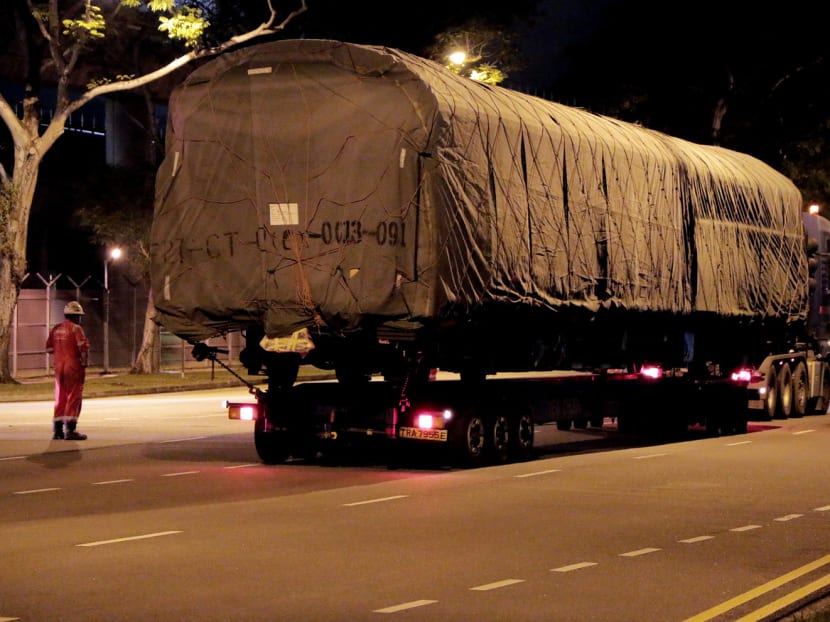Train cracks cast doubts on China’s rail ambitions
BEIJING — The discovery of hairline cracks on 26 Singapore SMRT trains that have been shipped to their Chinese manufacturer for repairs has raised questions on China’s ambitions to win export deals for its rail equipment.

In the early morning of June 12, the defective trains are transported out of SMRT's Bishan Depot. (Photo: FactWire)
BEIJING — The discovery of hairline cracks on 26 Singapore SMRT trains that have been shipped to their Chinese manufacturer for repairs has raised questions on China’s ambitions to win export deals for its rail equipment.
China’s state-owned rolling stock manufacturers, which dominate their domestic market, have pushed hard in the last decade to win export orders in developed countries, taking on companies from Japan, Korea, Europe and Canada.
While Chinese groups have struggled to export the country’s high-speed rail technology — despite building the world’s largest network in just five years — they have been more successful in winning tenders for metro cars in developed markets such as Singapore and the United States.
CSR Qingdao Sifang Locomotive, together with Japan’s Kawasaki Heavy Industries, won a contract in 2009 to supply 22 trains to two of Singapore’s metro lines, followed by an order for another 13 trains in 2012.
CNR, a domestic rival of CSR, also won a US$567 million (S$764.9 million) contract to supply passenger cars to Boston’s subway in 2014. CSR also bid, but it was eliminated when Massachusetts transport officials ruled that the technical, manufacturing and quality assurance components of its bid were “unacceptable”.
After winning the Boston contract, CNR and CSR merged to create a national export champion by ensuring the two companies did not undercut each other when competing for overseas contracts. The new firm, CRRC, began trading in June last year with over 170,000 employees.
The problems in Singapore are likely to underline the concerns that many in the world’s rail industry have privately expressed about the potential problems of relying on Chinese suppliers.
Some mass transit operators have privately said Chinese manufacturers might struggle to meet those requirements, which have sometimes caused severe problems even for highly experienced suppliers such as Siemens.
Last year, CSR Sifang won a HK$6 billion (S$1.04 billion) contract from Hong Kong’s mass transit operator, MTR Corporation, in the largest order of new rolling stock for the Hong Kong system.
Yesterday, FactWire News Agency, which first broke the news about the defective SMRT trains, published several redacted emails suggesting that Hong Kong’s Transport and Housing Bureau had been warned about the “undercarriage cracking problem” with the Singapore trains last year before it awarded a contract to CSR for 93 new trains.
On Wednesday, Hong Kong’s Secretary for Transport and Housing, Anthony Cheung Bing-leung, said the bureau was not aware of the problems with Singapore’s trains.
But FactWire’s report suggested that the bureau received several emails about the defect in Singapore’s trains from January to August 2015.
Factwire did not identify the sender, but the emails urged the bureau to “freeze the tender assessment” and were addressed to Mr Cheung.
AGENCIES








